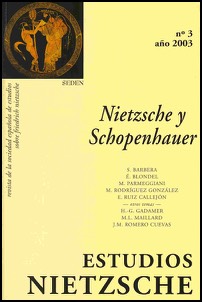La moral de la compasión y la genealogía necesaria
DOI:
https://doi.org/10.24310/EstudiosNIETen.vi3.9111Abstract
Este artículo comienza con una pregunta sobre una importante afirmación en la moral aristocrática. Es un estudio sobre la crítica de Nietzsche al significado ético de la compasión en Schopenhauer y una evaluación sobre el valor de la moral aristocrática en nuestros días en relación con el sufrimiento.
Downloads
Metrics
References
Arteta, A., La compasión. Apología de una virtud bajo sospecha, Paidós, Barcelona, 1996, p. 30.
Berkowitz, P., Nietzsche. La ética de un inmoralista, ed. M. Cóndor, Cátedra, de Ediciones, México, 1967, «Virtud», pp. 381-382.
Cartwright, D. E., «Kant, Schopenhauer, and Nietzsche on the morality of pity», In Journal of the history of ideas, 45, 1984, 83-98.
Nietzsche, F., Correspondencia I-VI. (CO). Director ed. Luis E. de Santiago Guervós. Madrid : Trotta, 2005- 2012.
Nietzsche, F., Fragmentos Póstumos I-IV (FP). Director ed. Diego Sánchez Meca. Madrid: Tecnos, 2006-2010.
Nietzsche, F., Obras Completas, I-IV (OC ). Director ed. Diego Sánchez Meca. Madrid: Tecnos, 2011-2016.
Schopenhauer, A., El mundo como voluntad y representación, tr. E. Ovejero y Maury, Aguilar, Madrid, Buenos Aires / México, 1960.
Schopenhauer, A., Los dos problemas fundamentales de la ética, ed. P. López de Santa María, Siglo XXI, Madrid, 1993, «Sobre el fundamento de la moral»,
Downloads
Published
How to Cite
Issue
Section
License
As of issue 21 (2021) this journal is published only in open access (diamond route).
From that number 21, like the previous numbers published in NIETZSCHE STUDIES, they are subject to the Creative Commons Acknowledgment-NoComercia-ShareIgual 4.0 license, the full text of which can be consulted at <http://creativecommons.org/licenses/by-nc-sa/4.0 >
It is the responsibility of the authors to obtain the necessary permissions of the images that are subject to copyright.
This work is licensed under a Creative Commons Attribution-NonCommercial-ShareAlike 4.0 International License.
Copyright generates two different rights: moral rights and patrimonial rights that EJFB recognizes and respects. Moral rights are those relating to the recognition of the authorship. They are rights of a personal nature that are perpetual, inalienable, unseizable and imprescriptible as consequence of the indivisible union of the author and his/her work.
Patrimonial rights are those that can be derived from the reproduction, distribution, adaptation or communication of the work, among others.







11.png)
